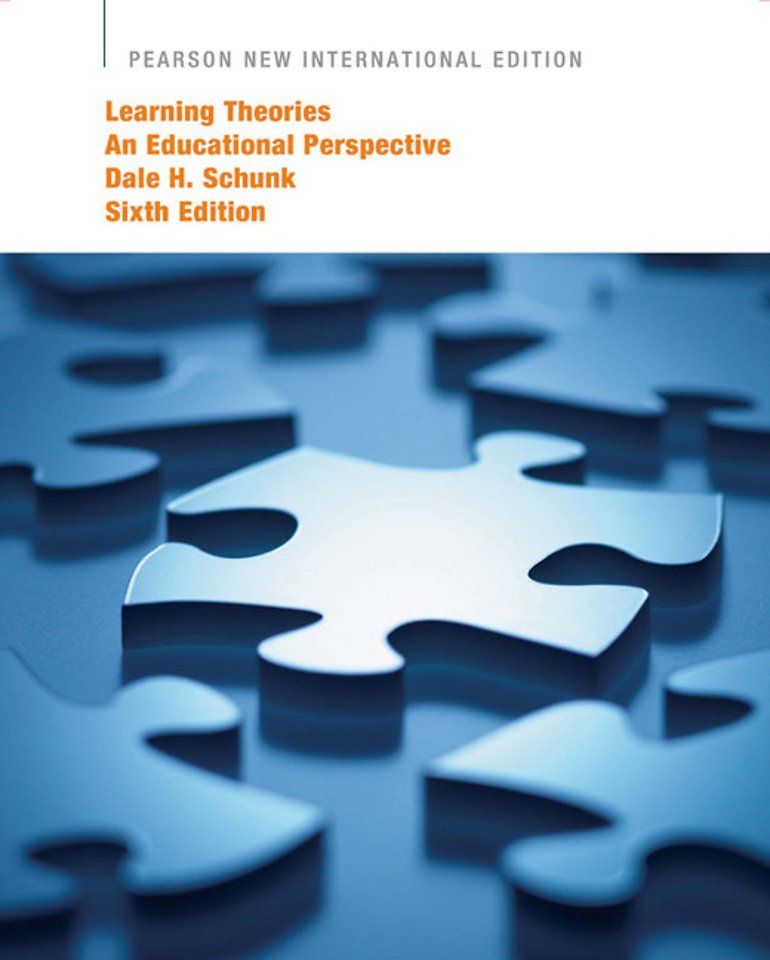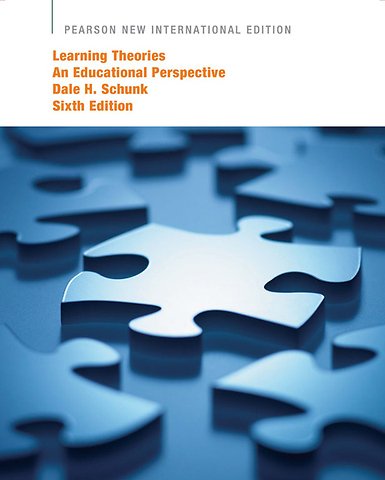Learning Theories: Pearson New International Edition
An Educational Perspective
Samenvatting
For Learning Theory/Cognition and Instruction, Advanced Educational Psychology, and Introductory Educational Psychology courses.
An essential resource for understanding the main principles, concepts, and research findings of key learning theories –especially as they relate to education–this proven text blends theory, research, and applications throughout, providing its readers with a coherent and unified perspective on learning in educational settings.
Specificaties
Inhoudsopgave
Chapter 1 — Introduction to the Study of Learning
Learning Defined
Precursors of Modern Learning Theories
Learning theory and philosophy
Beginnings of the psychological study of learning
Structuralism and functionalism
Learning Theory and Research
Functions of theory
Conducting research
Assessment of Learning
Direct observations
Written responses
Oral responses
Ratings by others
Self-reports
Relation of Learning and Instruction
Historical perspective
Instructional commonalities
Integration of theory and practice
Critical Issues for Learning Theories
How does learning occur?
What is the role of memory?
What is the role of motivation?
How does transfer occur?
Which processes are involved in self-regulation?
What are the implications for instruction?
Three Learning Scenarios
Kathy Stone’s third-grade class
Jim Marshall’s U. S. History class
Gina Brown’s educational psychology class
Summary
Further Reading
Chapter 2 — Behaviorism
Connectionism
Trial-and-error learning
Laws of exercise and effect
Other principles
Revisions to Thorndike’s theory
Instructional applications
Classical Conditioning
Basic processes
Informational variables
Biological influences
Conditioned emotional reactions
Contiguous Conditioning
Acts and movements
Associative strength
Rewards and punishments
Habit formation and change
Operant Conditioning
Conceptual framework
Basic processes
Behavioral change
Behavior modification
Self-regulation
Instructional Applications
Behavioral objectives
Learning time
Mastery learning
Programmed instruction
Contingency contracts
Summary
Further Reading
Chapter 3 — Neuroscience of Learning
Organization and Structures
Neural organization
Brain structures
Localization and interconnections
Brain research methods
Neurophysiology of Learning
Information processing system
Memory networks
Language learning
Brain Development
Influential factors
Phases of development
Critical periods
Language development
Motivation and Emotions
Motivation
Emotions
Instructional Applications
Relevance of brain research
Educational issues
Brain-based educational practices
Summary
Further Reading
Chapter 4 — Information Processing Theory
Information Processing System
Assumptions
Two-store (dual-memory) model
Alternatives to the two-store model
Attention
Theories of attention
Attention and learning
Attention and reading
Perception
Gestalt theory
Sensory registers
LTM comparisons
Two-Store Memory Model
Verbal learning
Short-term (working) memory
Long-term memory
Influences on encoding
Long-Term Memory: Storage
Propositions
Storage of knowledge
Production systems and connectionist models
Long-Term Memory: Retrieval and Forgetting
Retrieval
Language comprehension
Forgetting
Mental Imagery
Representation of spatial information
Imagery in LTM
Individual differences
Instructional Applications
Advance organizers
Conditions of learning
Cognitive load
Summary
Further Reading
Chapter 5 — Social Cognitive Theory
Conceptual Framework for Learning
Reciprocal interactions
Enactive and vicarious learning
Learning and performance
Self-regulation
Modeling Processes
Theories of imitation
Functions of modeling
Cognitive skill learning
Motor skill learning
Influences on Learning and Performance
Developmental status of learners
Model prestige and competence
Vicarious consequences to models
Motivational Processes
Goals
Outcome expectations
Values
Self-Efficacy
Conceptual overview
Self-efficacy in achievement situations
Models and self-efficacy
Motor skills
Instructional self-efficacy
Health and therapeutic activities
Instructional Applications
Models
Self-efficacy
Worked examples
Tutoring and mentoring
Summary
Further Reading
Chapter 6 — Constructivism
Constructivism: Assumptions and Perspectives
Overview
Perspectives
Situated cognition
Contributions and applications
Piaget’s Theory of Cognitive Development
Developmental processes
Implications for instruction
Vygotsky’s Sociocultural Theory
Background
Basic principles
Zone of Proximal Development
Applications
Critique
Private Speech and Socially-Mediated Learning
Private speech
Verbalization and achievement
Socially mediated learning
Self-regulation
Motivation
Contextual factors
Implicit theories
Teachers’ expectations
Constructivist Learning Environments
Key features
APA Learner-Centered Principles
Instructional Applications
Discovery learning
Inquiry teaching
Peer-assisted learning
Discussions and debates
Reflective teaching
Summary
Further Reading
Chapter 7 — Cognitive Learning Processes
Skill Acquisition
General and specific skills
Novice-to-expert research methodology
Expert-novice differences in science
Conditional Knowledge and Metacognition
Conditional knowledge
Metacognition and learning
Variables influencing metacognition
Metacognition and behavior
Metacognition and reading
Concept Learning
The nature of concepts
Concept attainment
Teaching of concepts
Motivational processes
Problem Solving
Historical influences
Heuristics
Problem-solving strategies
Problem solving and learning
Experts and novices
Reasoning
Implications for instruction
Transfer
Historical views
Activation of knowledge in memory
Types of transfer
Strategy transfer
Teaching for transfer
Technology and Instruction
Computer-based learning environments
Distance learning
Future directions
Instructional Applications
Worked examples
Writing
Mathematics
Summary
Further Reading
Chapter 8 — Self-Regulation
Behavioral Theory
Self-monitoring
Self-instruction
Self-reinforcement
Social Cognitive Theory
Conceptual framework
Social cognitive processes
Cyclical nature of self-regulation
Social and self influences
Information Processing Theory
Model of self-regulation
Learning strategies
Constructivist Theory
Socilcultural influences
Implicit theories
Motivation and Self-Regulation
Volition
Values
Self-schemas
Help seeking
Instructional Applications
Academic studying
Writing
Mathematics
Summary
Further Reading
Chapter 9 — Motivation
Historical Perspectives
Drive theory
Conditioning theory
Cognitive consistency theory
Humanistic theory
Model of Motivated Learning
Pretask
During task
Posttask
Achievement Motivation
Expectancy-value theory
Familial influences
Contemporary model of achievement motivation
Self-worth theory
Task and ego involvement
Attribution Theory
Locus of control
Naïve analysis of action
Attribution theory of achievement
Social Cognitive Theory
Goals and expectations
Social comparison
Goal Theory
Goal orientations
Conceptions of ability
Perceptions of Control
Control beliefs
Learned helplessness
Students with learning problems
Self-Concept
Dimensions and development
Self-concept and learning
Intrinsic motivation
Theoretical perspectives
Overjustification and reward
Instructional Applications
Achievement motivation training
Attribution change programs
Goal orientations
Summary
Further Reading
Chapter 10 — Development
Beginnings of the Scientific Study of Development
Historical foundations
Philosophical foundations
The Child Study Movement
Perspectives on Human Development
Issues relevant to learning
Types of developmental theories
Structural theories
Bruner’s Theory of Cognitive Growth
Cognitive growth and knowledge representation
Spiral curriculum
Contemporary Developmental Themes
Developmental changes
Developmentally appropriate instruction
Transitions in schooling
Family Influences
Socioeconomic status
Home environment
Parental involvement
Electronic media
Motivation and Development
Developmental changes
Implications
Instructional Applications
Learning styles
Case’s instructional model
Teacher-student interactions
Summary
Further Reading
Glossary
References
Author Index
Subject Index
Anderen die dit boek kochten, kochten ook
Net verschenen
Rubrieken
- aanbestedingsrecht
- aansprakelijkheids- en verzekeringsrecht
- accountancy
- algemeen juridisch
- arbeidsrecht
- bank- en effectenrecht
- bestuursrecht
- bouwrecht
- burgerlijk recht en procesrecht
- europees-internationaal recht
- fiscaal recht
- gezondheidsrecht
- insolventierecht
- intellectuele eigendom en ict-recht
- management
- mens en maatschappij
- milieu- en omgevingsrecht
- notarieel recht
- ondernemingsrecht
- pensioenrecht
- personen- en familierecht
- sociale zekerheidsrecht
- staatsrecht
- strafrecht en criminologie
- vastgoed- en huurrecht
- vreemdelingenrecht







